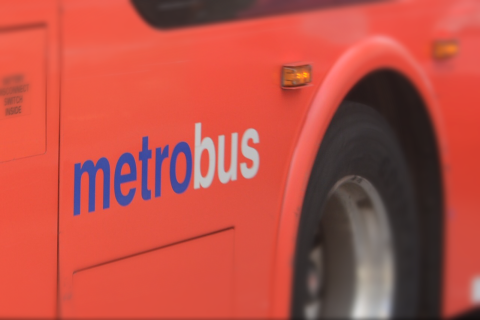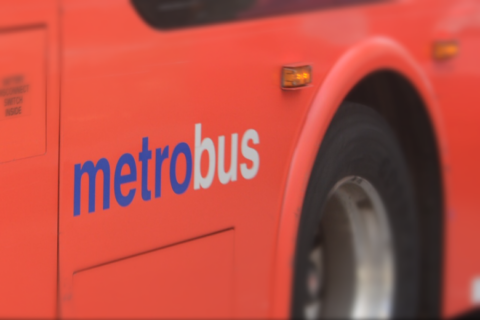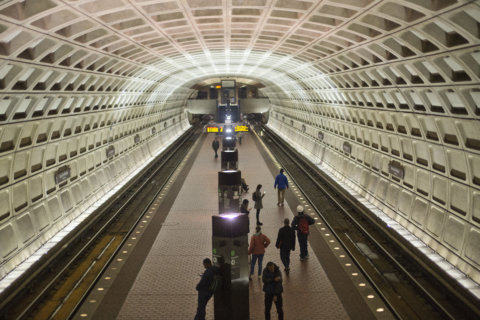
A Metrobus strike disrupting thousands in Northern Virginia will likely drag on, and could begin to impact bus routes that have been providing limited alternatives for travelers.
Amalgamated Transit Union Local 689 sees the ongoing strike against a Metro contractor at the Cinder Bed Road garage in Lorton as part of a broader fight against private contracting, and other pay and staffing cuts in the transit industry.
“The only way to say it, and I don’t know a better way to say it, is that they are treating American workers like slaves,” Local 689 President Raymond Jackson said.
Local 689 went on strike against Metro contractor Transdev at the recently privatized Cinder Bed Road facility on Oct. 24, with the two sides remaining far apart at the bargaining table. They met again thrice — on Thursday, Friday and Saturday — all without reaching a deal.
“Transdev regrets the hardship and inconvenience caused by the work stoppage and remains fully committed to coming to an agreement as quickly as possible,” Transdev North America Vice President of Marketing and Communications Mitun Seguin said in an email Sunday.
“Transdev continues to bargain in good faith and welcomes employees to return to work at any time while working toward a contract,” Seguin said.
A week earlier, Seguin said Transdev was disappointed the union went on strike after about 10 months of ongoing negotiations.
It is not unusual for new or updated transit industry contracts to take months or years to work out.
There is no clear path out of the strike, with the union demanding pay more in line with other Metrobus or regional operators and the company most recently offering a raise of 20 cents per hour from current rates, the union said.
Transdev is suggesting federal mediation of the dispute, but the union’s chief negotiator would prefer to continue current talks.
“I’m not convinced that a mediator at this point is the way to go, because I think we’re still willing to talk,” John Lyons said.
“This is probably the most frustrating negotiations I’ve ever been involved with,” he added.
Transdev has only run a fraction of the Metrobus service it is responsible for since the strike began, and Metro has said it has no role in the dispute between the workers operating Metrobus service for Transdev and the private company Metro has a contract with.
Routes 17B, 17G, 17H, 17K, 17L, 17M, 18G, 18H, 18J, 18P, 29C, 29G, 29W, S80 and S91 have not run at all during the strike. Routes 29K, 29N and REX service have run only on reduced, weekend schedules.
The limited alternatives include Fairfax Connector buses, but Transdev is also in difficult contract talks with Fairfax Connector drivers under its contract with Fairfax County. Those drivers plan a strike authorization vote Saturday, union officials said, and their contract expires at the end of the month.
Negotiations on that separate contract are scheduled Tuesday and Wednesday with largely the same main negotiators as those involved in the Cinder Bed Road contract.
“We already have a strike going on here at Cinder Bed Road, if Fairfax Connector decides to go on strike, if those members decide to go on strike, now you’ve shut down the entire Northern Virginia transportation system almost,” Lyons said.
The Fairfax Connector drivers are part of a different local within the Amalgamated Transit Union, but union leaders see the negotiations with the private contractor as part of the same fight that could set a precedent for any future deals in the region, including operations of the Silver Line extension into Loudoun County.
“They’re just fighting for the profit,” Jackson said.
The fight could also spill over into Metro’s direct collective bargaining with Local 689, with the traditional transit agreement set to expire in July.
Jackson suggested the union would have no problem striking against the broader Metro system based on a strike authorization vote taken last year, particularly if the union feels Metro is trying to simply get around its agreements with current workers.
“If that is the intention, then it’s going to get worse than anybody could ever imagine,” Jackson said.
Metro has said it is only contracting out new work, not existing work, which is allowed by the current collective bargaining agreement and related laws.
The agreement and other legal requirements generally prohibit the union from striking.
“I hope that it doesn’t come to this, but if it does … 689 isn’t looking for any fights, we’re willing to sit down at the table and work with anybody that is willing to work with us, but if you bring us a fight, we’re going to take it,” Jackson said.
However, Jackson said not all actions would be disclosed publicly in advance so that Metro or contractors are unable to prepare for them.
“Whatever action we’re going to do that’s going to affect the riders, we’ll make sure the riders in the region get enough notice about whatever action we’re going to do,” Jackson said.









